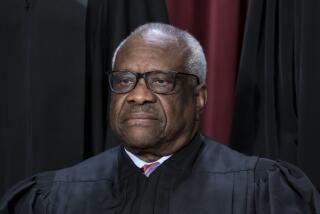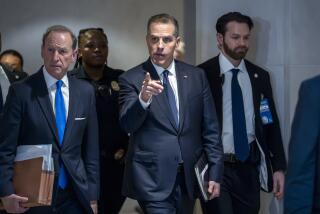Senator Says He Expects Lay to Testify Before Committee
- Share via
The chairman of a Senate committee investigating Enron’s collapse said Friday that he expects Kenneth L. Lay to testify next week, although a Lay spokeswoman said the ousted Enron Corp. chairman was still weighing a decision.
Separately, lawmakers said they are expanding their inquiry to include the role played by at least two Wall Street banks in Enron’s collapse. The banks invested in some of Enron’s off-the-books partnerships, apparently in the hope Enron would return the favor by sending other business their way.
Lay was scheduled to speak voluntarily to the Senate Commerce Committee this week, but canceled his appearance because of what his lawyers called the “prosecutorial” comments of lawmakers on the eve of his appearance.
Sen. Byron Dorgan (D-N.D.), chair of the Senate Commerce subcommittee on consumer affairs, said he expects Lay to testify because his attorneys have not notified the committee of any plan to assert Lay’s 5th Amendment right against self-incrimination. The full Commerce Committee subpoenaed Lay to appear Tuesday after he canceled his voluntary appearance.
“Normally they would have done that by now,” Dorgan said. “We told Lay’s attorney Friday that we are preparing for a hearing in which Lay will answer questions and they said, ‘We can’t disagree.’
“This will be an opportunity for Mr. Lay to tell his side of the story,” Dorgan said. “The committee wants to hear from him and the country wants to hear from him.”
But spokeswoman Kelly Kimberly said Lay had not made up his mind.
“This is an important decision,” Kimberly said. “He’s weighing it very carefully.”
If he testifies, Lay faces a political and legal quagmire, experts say. Many criminal attorneys agree that it’s in Lay’s best interest to refuse to testify until it is known whether he is a target of the criminal probe.
On the other hand, refusing to testify could bring a flurry of criticism--particularly after his right-hand man, former Chief Executive Jeffrey K. Skilling, appeared before committee members Thursday and denied any responsibility for the company’s collapse.
That could put pressure on Lay to testify to salvage his reputation.
“It’s very difficult to control high-profile clients like this,” said Joseph diGenova, a former prosecutor and a partner at diGenova & Toensing in Washington. “They think they can talk their way out of everything. They overestimate their powers of persuasion and underestimate their Darth Vader qualities.”
He and other Washington attorneys said it was likely that Lay’s attorney, Earl Silbert, was recommending that his client take the Fifth.
“There are almost no pros for Ken Lay’s giving testimony,” said Stephen Ryan, a lawyer with the Washington office of Manatt, Phelps & Phillips and a former general counsel for the Senate Governmental Affairs Committee.
“Ken Lay should no longer be worried about the court of public opinion; he has to be worried about the court of criminal law,” Ryan said. When Lay faces the committee--and the cameras--Tuesday, it’s unlikely that he’ll have the option of answering some questions and rejecting others.
“Once you start testifying, it’s hard to stop,” said Dan Rinzel, a former congressional investigator and now an attorney at Redmon, Peyton & Braswell. “If you open up the door and start answering questions, you way waive your rights and it’s too late.”
Also on the schedule to testify Tuesday is William C. Powers, who led a special internal investigating team that accused Lay of failing to fulfill his oversight duties.
Motives of Investors in Question
Another congressional committee said Friday that it plans to expand its probe to include Merrill Lynch & Co., Wachovia Bank and other financial institutions that invested in some of the controversial Enron partnerships despite being warned about potential conflicts. Officials at Merrill and Wachovia invested in LJM2, one of the partnerships controlled by fired Enron Chief Financial Officer Andrew S. Fastow.
Both firms said they were told that they would receive a bigger piece of Enron’s bond business if they invested in the partnerships, congressional investigators said.
“We want to know if they were aware that they were engaging in transactions that were off the books, and therefore deceitful,” said Rep. James Greenwood (R-Pa.), chair of the House Energy and Commerce subcommittee on oversight and investigation.
Merrill Lynch spokesman Joe Cohen defended the company’s involvement in the LJM2 partnership.
“Our dealings with Enron were proper,” Cohen said. “Like every major Wall Street firm, we did Enron-related business, including one investment in a single partnership.”
Merrill helped raise about $350 million for the partnership from institutions and wealthy individuals, including $16 million from Merrill executives and $5 million from the firm itself. Officials at Wachovia did not return a phone call Friday seeking comment.
Dorgan, who has been attempting to obtain a list of all investors in the various partnerships, said he discussed the issue Friday with the company’s interim CEO, Steve Copper, and was assured that Copper would attempt to turn over the partnership documents.
“He indicated that he was looking for the same information,” Dorgan said.
Previously, Enron attorneys had refused to turn over the records or said they did not have them.
Dorgan’s committee also plans to hear soon from Sherron S. Watkins, the Enron vice president who warned Lay about the company’s accounting problems in a memo in August.
Testimony from other mid-level Enron employees is likely, investigators said.
Ken Johnson, a spokesman for the House Energy and Commerce Committee, said one of the first things investigators need to do is “retrace our steps and corroborate some of the testimony that was given before the committee.”
For instance, he said the committee would search for other Enron employees who might know about attempts by Enron attorney Jordan Mintz to obtain Skilling’s signature on an approval sheet for one of the off-the-books partnerships. Mintz testified that he tried three times to meet with Skilling, but Skilling said he did not recall such efforts.
Phil Schiliro, chief of staff to Rep. Henry A. Waxman (D-Los Angeles), a senior member of the House Energy and Commerce Committee, said, “There’s a long way to go before we understand this.”
Seeking Ouster of Retirement-Plan Trustee
Given that a number of key players have invoked their 5th Amendment right against self-incrimination, he said it is more important for investigators to talk to other insiders in the company “so we can put all the pieces together.”
Meanwhile, Rep. George Miller (D-Martinez), top Democrat on the House Education and Workforce Committee, called on Labor Secretary Elaine Chao to remove Cindy Olson as a trustee of Enron’s 401(k) plan, contending that she failed to act to protect the retirement funds after being warned about the company’s financial peril. Employee retirement funds were invested in Enron stock, which plummeted months after the warnings were first raised.
“Frankly, I was shocked by Ms. Olson’s testimony and was immediately concerned for the thousands of employees at Enron who still have investments in the Enron pension plan,” Miller said. “I am urging Secretary Chao to act immediately to remove Ms. Olson and others who failed to meet their legal obligations to protect the retirement investments of Enron employees.”
Olson could not immediately be reached for comment.
Attorney Eli Gottesdiener, whose firm sued Enron in November over the 401(k) losses, said Friday that Olson failed in her duty to protect plan participants. Gottesdiener said he and other lawyers for employees would ask Federal District Judge Melinda Harmon to remove all Enron executives as trustees from the plan.
Meanwhile, Defense Secretary Donald H. Rumsfeld, questioned about published reports that the Pentagon was among other federal agencies asked last week to preserve Enron-related documents, said that complying with such a request would “be a perfectly proper, responsible thing to do.”
However, Rumsfeld said he had not seen such a request and did not know of any specific defense records relating to Enron that would be helpful to the investigation.
*
Times staff writers Walter Hamilton and Liz Pulliam Weston contributed to this report.
More to Read
Inside the business of entertainment
The Wide Shot brings you news, analysis and insights on everything from streaming wars to production — and what it all means for the future.
You may occasionally receive promotional content from the Los Angeles Times.











